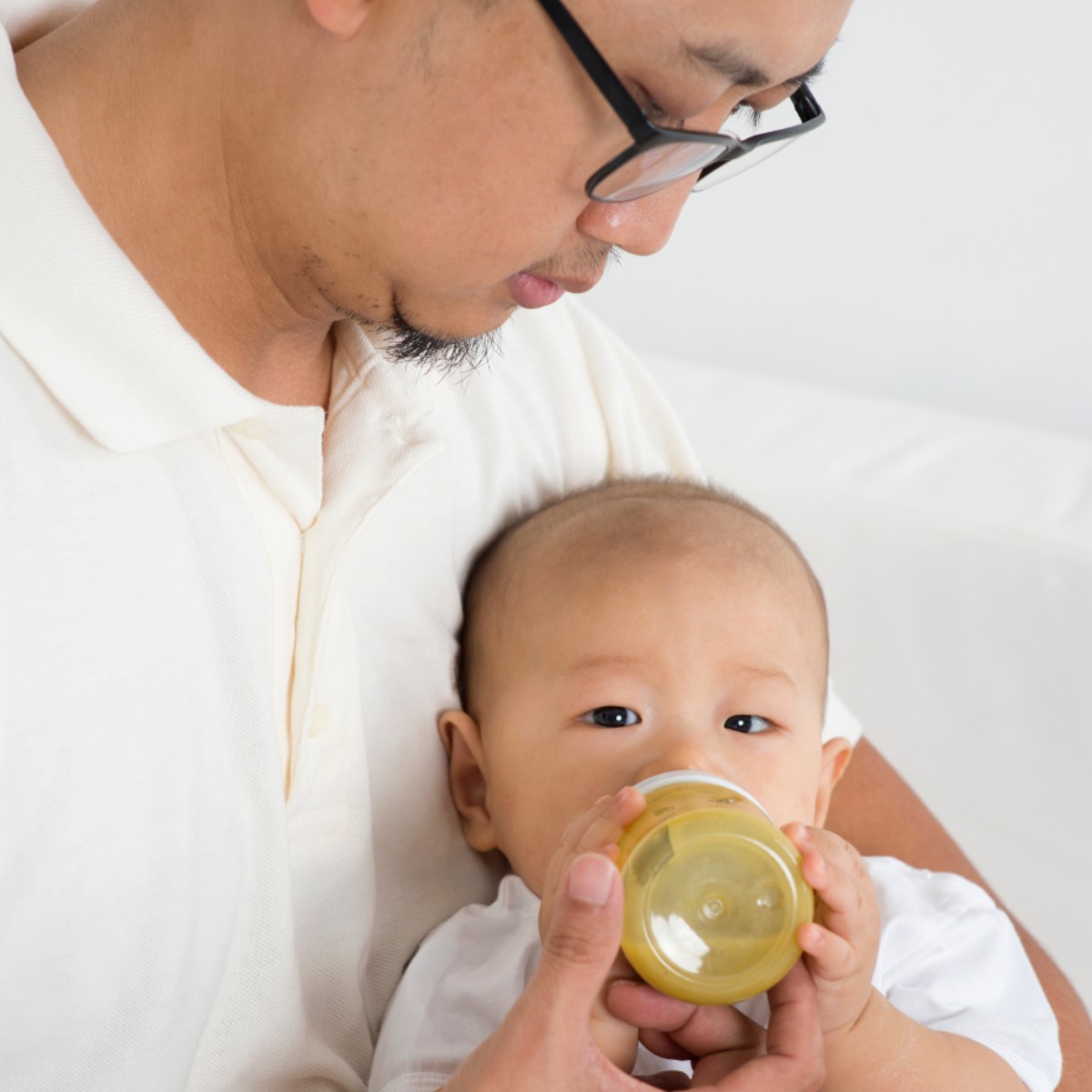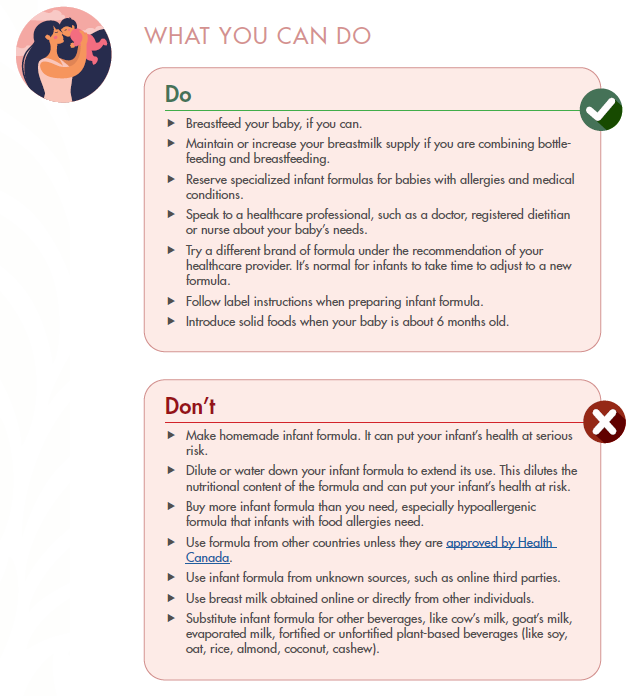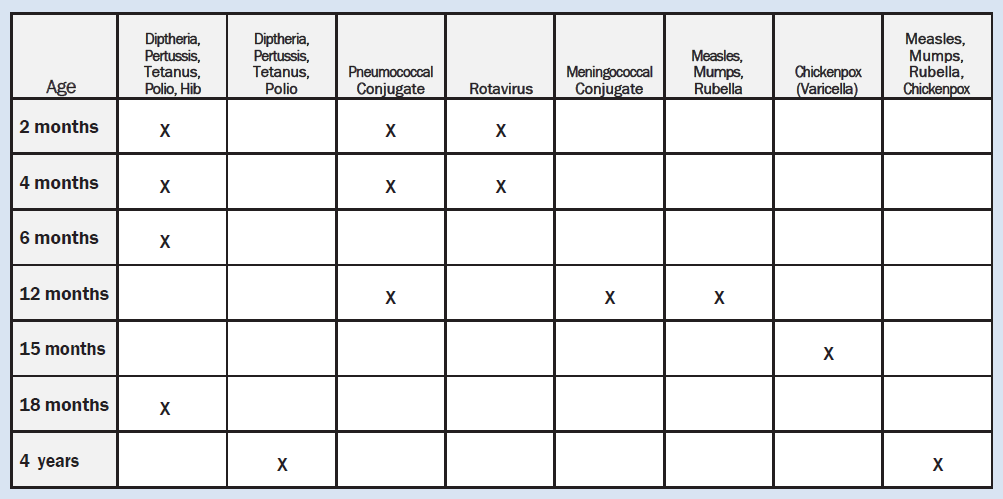Birth to 3 Years .png)
On this page:
Postnatal and Newborn Health
Postnatal health
Best Start’s Healthy Start for Baby and Me book describes the physical changes you can expect from your body after birth.
Learn about caring for yourself, caring for your baby, family health, pregnancy and infant loss, and resources in the Postpartum Health Guide (Public Health Agency of Canada).
For mental health information, visit our Mental Health pages for Pregnancy and Birth to 3 Years.
New Parent Guide (PDF)
Newborn care
Find out what to expect in the first three months.
Feeding Your Baby
Help your child develop healthy eating habits from the start!
Deciding how you feed your baby is a personal choice.
Learning about feeding options when you’re pregnant helps you be prepared for when your baby arrives. Reliable sources of information include:
- Your primary health care provider
- A Canadian prenatal or breastfeeding class
Below is some information to ensure that your feeding plan works for you and is feasible, affordable, sustainable and safe.
The World Health Organization (WHO), Health Canada, Dietitians of Canada and the Canadian Paediatric Society recommends breastfeeding exclusively for the first six months and continue to breastfeed for up to two years or longer with the introduction of solid foods.
I’m looking for information on:
Breastfeeding
Breastfeeding is a wonderful way to feed and nurture your baby and has many benefits to both mother and baby. Health Canada recommends exclusive breastfeeding for the first six months. Continuing to breastfeed for two years and beyond following the introduction of complementary foods is important for the growth and development of infants and toddlers.
Benefits of breastfeeding include:
|
For babies:
• safest choice
• easy to digest
• right amount of nutrients and energy that change to meet baby’s needs as they grow
• promotes healthy tooth and jaw development
• protects the immune system
• protects against allergies, asthma, respiratory infections and ear infections
• protects against gastrointestinal infections and diseases like Crohn’s disease
• protects against chronic diseases like diabetes, heart disease and some cancers
• reduces the risk of Sudden Infant Death Syndrome (SIDS)
• higher IQ scores
|
For moms:
• produces naturally soothing hormones which help increase calmness and confidence
• helps prevent postpartum hemorrhage
• protects against breast, ovarian and uterine cancers
|
For family and community:
• free
• convenient
• skin-to-skin contact promotes a loving and secure relationship
• parents miss less work because children are healthier
• reduces healthcare costs
• protects the environment
|
A Guide for New Parents (PDF)
Babies who are breastfed or receiving breast milk need a daily Vitamin D supplement of 400 IU (10 µg) from birth to 2 years old. This is available at pharmacies. Vitamin D protects your baby from getting a bone disease called rickets (Health Canada). Babies who are formula feeding do not need additional Vitamin D because it has been added to formula.
Breastfeeding Support Services we offer:
Timiskaming Breastfeeding Buddies Facebook Support Group is a closed Facebook page for mothers across the district of Timiskaming. Parents can post questions, information or anything else relating to breastfeeding and parenthood. The THU Healthy Babies Healthy Children (HBHC) nurses are on the page to assist with questions and provide any resources that you might need.
Public Health Nurses and our Board Certified Lactation Consultant answer questions and provide support for breastfeeding mothers. Contact us to speak to a nurse. These services are offered by phone, virtually or in person (in office or in your home).
We can help with:
- Education on breastfeeding/chestfeeding
- Latching & positioning
- Infant weights
- Managing pain and discomfort while feeding and/or pumping
- Milk supply (too much or too little)
Breastfeeding Classes. Learning about breastfeeding before your baby arrives helps you have a successful breastfeeding experience. Classes can be offered 1 on 1 or in groups, online or in-person. Support persons are welcome and encouraged to attend. Contact us for more information.
Have questions about breastfeeding? Check out Breastfeeding FAQ or contact us to speak to an HBHC nurse.
While Timiskaming Health Unit has decided to not renew our Baby Friendly Initiative (BFI) designation, we continue to advocate for and support breastfeeding within our communities.
Additional support is available through the following resources:
- Health811 (formerly called Telehealth Ontario) has a 24 hour telephone service, where all nurses are specially trained in providing breastfeeding support. You can reach them at 1-866-797-0000
- La Leche League supports families looking for information on breastfeeding from pregnancy to weaning.
Best Start Resource Centre has developed several helpful resources for breastfeeding mothers:
- The Mixing Alcohol and Breastfeeding resource will help you make an informed choice about drinking alcohol while breastfeeding.
- Breastfeeding Matters is an informative booklet that covers many topics about breastfeeding, including getting started, and common issues and concerns with breastfeeding.
- Breastfeeding for the Health and Future of Our Nation is a booklet for Indigenous parents about breastfeeding. Available in English (pdf) and Ojibway (pdf).
- Breastfeeding Your Baby This graphic helps nursing mothers recognize signs that baby is getting enough milk.
- Ontario Human Rights Commission Brochure This brochure outlines information on your rights as a pregnant or breastfeeding woman, employment laws and where to seek more information.
Breastfeeding FAQ
Have questions about breastfeeding? Below are some frequently asked questions.
If you didn’t find an answer to your questions below, please contact us and ask to speak to a Healthy Babies Healthy Children (HBHC) nurse or to our Board Certified Lactation Consultant.
How long should I breastfeed?
The recommendation is to breastfeed exclusively for the first six months and continue to breastfeed for up to two years or longer with the introduction of solid foods. This recommendation is supported by the Timiskaming Health Unit, Health Canada, Dietitians of Canada, Canadian Paediatric Society, the World Health Organization and the Breastfeeding Committee for Canada.
Can I still get pregnant while breastfeeding?
The Lactation Amenorrhea Method (LAM) helps women who wish to use breastfeeding as a form of birth control. This method is 98% effective in preventing conception if three conditions are met:
- The individual is not menstruating
- Exclusively Breastfeeding day and night with minimal intervals between feeds.
- Baby is less than 6 months old
Are my nipples supposed to be sore while breastfeeding/chestfeeding?
Sore nipples is a very common complaint of new mothers and are one of the most frequent reasons that mothers stop breastfeeding sooner than they planned. The two most common causes of sore nipples are incorrect latching and incorrect positioning. Breastfeeding/Chestfeeding should not be painful. Speak with a Public Health Nurse or Board Certified Lactation Consultant at the Health Unit for more guidance.
What is Vitamin D and why does my baby need it?
Babies who are breastfed or receiving breast milk need a daily Vitamin D supplement of 400 IU (10 µg) from birth to 2 years old. This is available at pharmacies. Vitamin D protects your baby from getting a bone disease called rickets (Health Canada). Babies who are formula feeding do not need additional Vitamin D because it has been added to formula.
Can I take medication while breastfeeding?
Most medications are safe to take while breastfeeding your baby, there are very few drugs that may impact baby’s health. Please visit LactMed or talk to your health care provider, or pharmacist for more information on a specific medication.
Can I consume alcohol while breastfeeding?
Although choosing not to drink is the safest choice for breastfeeding mothers, there is no need to stop breastfeeding if you choose to consume an occasional drink. Alcohol can reach your baby through your breastmilk. Ideally it is best to avoid breastfeeding for about 2 hours after drinking one alcoholic beverage. For more information, check out Mixing alcohol and breastfeeding (Best Start Resource Centre) or talk to your health care provider.
I smoke. Can I still breastfeed my baby?
Even if you smoke, breastfeeding is still the best choice for your baby. Although babies receive nicotine though breastmilk and second hand smoke can be harmful for your baby’s health, the benefits usually outweigh the risk. If you are ready to quit or want more information, please visit this page. Here are some more tips to consider:
- Don’t smoke around your baby
- Smoke outside the house
- Smoke after you breastfeed rather than before
- Wash your hands after smoking
- Change your clothes after smoking
What should I know before I decide whether breastfeeding or formula feeding is best for me and my baby?
Decisions around feeding your baby is a personal choice. Please check out our Feeding Your Baby page to help you understand the options and decide what’s best for you and your baby.
What are the risks associated with formula feeding?
Commercial infant formula is produced in large manufacturing facilities where any undetected error in the formulation could put the baby’s health at risk. There is also the possibility of bacterial or chemical contamination during the production and packaging process. In both cases the manufacturer will seek to recall the product. Formula can also become contaminated during the preparation and storage in the home.
When can I start offering my baby solid food?
You can begin introducing solid foods to your baby at about six months old. You’ll know baby is ready to start solids when they can:
- Sit up without support and have good neck control
- Show interest in food when others are eating
- Ability to pick up food and put in their mouth
- Open their mouth when they see food coming
- Can let you know when they are full
- Hold food in their mouth without their tongue pushing it out
It’s recommended that babies start with iron-rich foods to support their growth and development. Please see our Healthy Eating for Babies section and Infant Feeding (Unlock Food) for more information.
What are my breastfeeding rights?
You have protected rights as a breastfeeding mother by the Ontario Human Rights Commission. You can breastfeed anywhere, anytime. No one can stop you from breastfeeding because you are in a public area. You should never be asked to cover up, be more discreet or move to another area.
If you are breastfeeding and returning to work your employer should help with any needs you have to breastfeed or express your milk. You have the right to be free from discrimination from your employer, coworkers and clients. It may be important to remind your workplace that breastfeeding helps to keep you a valuable employee. For more information on breastfeeding and returning to work Returning to Paid Employment | La Leche League Canada - Breastfeeding Support and Information (lllc.ca).
If you are an employer you’ll benefit by offering a workplace supportive of breastfeeding by having improved worker productivity, morale and loyalty while having less absenteeism and staff turnover.
This document can help you to create a breastfeeding friendly workplace (OPHA)
This information from the Ontario Human Rights Commission provides more information on your rights in pregnancy and breastfeeding. Full colour brochure here.
Formula Feeding Your Baby
While breastfeeding is recommended by Health Canada for the first six months and up to 2 years and beyond, for some families, breastfeeding isn’t an option. If you are thinking of formula feeding your baby, it’s important to understand the options for feeding your baby and decide what’s best for you and your baby.
Timiskaming Health Unit public health nurses can answer any questions you may have and help you make the choice that works best for your family.
If you decide formula feeding is the best choice for your family
Liquid or powder formulas?
- Ready-to-feed - No water is needed
- Liquid concentrate - Needs to be mixed with sterilized water
- Powder - Needs to be mixed with sterilized water
Ready-to-feed and liquid concentrate formulas are sterile until the can is opened. Powdered formula is not sterile and may carry harmful bacteria that can make your baby sick if not prepared safely. Babies who have the greatest chance of infections should have sterile liquid formula such as ready-to-feed or liquid concentrate formulas. Powered formula is not sterile and has made some babies sick. Babies who are at the greatest risk of infections from powdered infant formula are those who:
- Are premature.
- Had low birth weight and are under two months of age.
- Have a weakened immune system, meaning they are more likely to get sick if exposed to germs.
For more information and how to prepare Infant Formula: what you need to know to learn how to safely prepare, store and feed your baby formula.
Information for families on the limited supply of infant formula
Since 2022, parents have been experiencing limited availability of infant formula in Canada due to market disruptions. Currently, regular infant formula powders have been more challenging to find.
To help address the issue, Health Canada is temporarily allowing imported infant formula from other countries to be sold in retail stores and pharmacies. New regular infant formulas are now appearing in stores and pharmacies, with more expected in May 2023. While these imported brands may be unfamiliar, they are safe for infants and meet Canadian quality and manufacturing standards.
If you cannot find your usual brand, you can safely switch to another brand using Health Canada's guidance - Limited supply of infant formula, April 2023.
For more information on imported products, check: Products imported for consumers (Health Canada)

With formula recalls and shortages covered in the news, some families have turned to using home made formulas. Health Canada advises Canadian parents and caregivers to be aware of the potential health risks associated with homemade infant formulas. Homemade infant formulas can cause severe malnutrition and potentially fatal illness in infants. Do not use regular cow’s milk or other animal milks. These do not have the right amount of nutrients and may be harmful to your baby. It’s recommended to introduce 3.25% homogenized whole cow’s milk at 9-12 months of age once your infant is eating a variety of iron rich foods at least twice a day.
Should I mix my breast milk and formula together in the same bottle?
The answer is NO! Avoid mixing human milk with formula to make a full feed. When cow’s milk formula is mixed with expressed human milk, there is a decrease in the number of lysozymes in human milk and a potential increase in E-coli. Use your express breast milk first, then if you need more, give formula separately afterwards. If you have any questions about feeding your baby, speak with your health care provider. You can also call THU to speak with one of our Public Health Nurses in the HBHC program or/and our Lactation Consultant at 1-866-747-4305.
For more information:
Breastfeeding
Starting Your Baby on Solid Foods
Parenting in Timiskaming
Nutrition
Postpartum
Healthy eating can help you recover after childbirth. Eat plenty of vegetables, fruits, whole grain foods, and protein foods. Try to limit foods with added sodium, sugars, and saturated fat. Drinking plenty of water will keep you hydrated and support breastfeeding. If you choose to breastfeed, take a multivitamin that contains 0.4mg of folic acid every day.
For more information, check out the Postpartum Health Guide (Public Health Agency of Canada).
For newborns to 24 months
Visit our Food & Healthy Eating - Baby page for information and resources.
See our Practical Tips to Help Children Try New Foods (R-46a-HBHC) (PDF)
Starting solids
This is an exciting time for you and your baby! You may notice that your baby is showing an interest in food, has developed good head control, can sit up in a high chair and doesn’t spit out the food you offer. These are all signs that your baby is ready for solid food and this usually happens around 6 months. You do not need to offer solid food before 6 months.
Visit Food & Healthy Eating – Baby for more information.
Sleep for Newborns to 3 Year Olds
|
Age
|
Recommended # of hours per night
|
|
0-3 months
|
14-17 hours of sleep, including naps
|
|
4-11 months
|
12-16 hours of sleep, including naps
|
|
1-2 years
|
11-14 hours of sleep, including naps, with consistent
bedtimes and wake-up times
|
|
3 years
|
10-13 hours of
good quality sleep, which may include a nap, with consistent bedtimes and
wake-up times
|
Source: 24 Hour Movement Guideline
For information on safe sleep tips for infants 0-12 months, visit Sleep Well, Sleep Safe (Best Start)
To learn how to prevent Sudden Infant Death Syndrome (SIDS), visit Safe Sleep for Your Baby (Public Health Agency of Canada)
Some tips for parents and caregivers to help your child get a good night’s sleep:
- Be a role model and make sleep a priority.
- Talk to your child about the importance of sleep and promote independence by involving your child in setting a sleep routine, when appropriate.
- Set a regular sleep and wake-up time; even on weekends.
- Avoid screen time (television, phone, tablet) at least one hour before bedtime.
- Set up a comfortable sleep environment that is cool, dark, quiet and free of televisions and other screen devices.
- Ensure children avoid sugar-sweetened and caffeinated food and drink.
- Be active outside during the day to improve sleep quality and duration.
Sleep for New Parents
It can be challenging for new parents to get the recommended 7 to 9 hours of sleep each night. Newborns can sleep as much as 18 hours a day, for 3 to 4 hours at a time. It’s normal for babies to wake during the night. As your baby gets older, they will stay awake longer during the day and sleep for longer stretches at night. To help get more sleep, try to sleep while your baby is sleeping and ask friends and/or family for help.
For more information, check out Caring for Kids.
Physical Activity for Newborns to 3 Year Olds
Physical activity can begin from birth. Playing with your baby helps them to be active, supports their development, and promotes a strong attachment between you and your child. Engage your baby to move and play in age-appropriate ways. Floor-based play is a great way to help your baby be active!
For infants less than a year old and not yet mobile, it’s recommended they get at least 30 minutes a day of tummy time spread throughout the day while they’re awake. Screen time (TV, tablet, cell phone) is not recommended at all.
From 1-3 years old, your child should get at least 180 minutes of physical activity each day. Continue to encourage them to be active and play with them. Children 2 years of age and under should not have screen time, while those aged 2-3 years should have no more than 1 hour of screen time.
Check out our Active Living page for children and youth for more information and resources!
For all young children, it’s also important they are not restrained for more than an hour at a time (for example, in a car seat, stroller or highchair) when sedentary (e.g., sitting or lying down). Engaging in reading and storytelling with a caregiver is encouraged as a great way for you to engage with your baby when not active.
Mental health for parents, caregivers, and babies
Postnatal mental health
It is normal to have a wide range of emotions after the birth of your baby.
Childbirth can be an exhilarating, exhausting and emotional time for families. It is not uncommon for new moms to experience crying spells and feeling sad, irritable, frustrated and fatigued within three to five days after delivery; however, if these feelings last for more than two weeks or are severe enough to interfere with your daily routine, it is time to seek help. You may be experiencing something known as perinatal mood and anxiety disorder (PMAD). This disorder can manifest itself in different ways such as anxiety, depression and, in extreme cases, psychosis.
Pregnant people are at risk of experiencing postpartum depression up to a year after having the baby. PMAD can be experienced by both mothers and fathers. If you need support, call a public health nurse to talk about how you are feeling or see your doctor/nurse practitioner as soon as you can. The sooner you get support, the better things will be for you and your family. Part of the Timiskaming Health Unit's Healthy Babies Healthy Children Program is to ensure the best possible outcomes for parents and their children. We offer help for families that might be suffering from postpartum mood disorder.

Have a look at Pregnancy and life with a new baby are not always what you expect to learn more about how PMAD may present themselves. If you or someone you know is struggling after the birth of a new baby, please call the Timiskaming Health Unit 705-647-4305 or toll free 1-866-747-4305 and ask to speak to a HBHC nurse. If you are in crisis, call or text 9-8-8 to reach the Suicide Crisis Helpline.
Having a support system can help promote connection and reduce stress and feelings of loneliness. Take time to connect with others and socialize with other new parents. Join a local playgroup or attend an EarlyOn or Brighter Futures program. Don’t hesitate to ask for help when you need it.
Partner and caregiver mental health
Partners and caregivers also experience changes with a baby in the family and may face some challenges in their new role – this is normal during this period of adjustment. Connecting with your baby through skin-to-skin contact and taking care of them can help you feel more comfortable.
Be sure to look after your own health. Reach out to family and friends to talk about your experience and seek additional support if needed. It is possible for partners and adoptive parents to experience postpartum depression. If you are experiencing symptoms of depression, speak to your health care provider.
For more information, visit the Postpartum Health Guide (Public Health Agency of Canada).
Mental health for babies and toddlers
 A baby’s brain develops very quickly in the first few years of life. A strong foundation in the early years helps your baby develop other skills as they grow, such as learning and self-regulation. Building attachment between you and your baby is key to their healthy emotional development. For babies and toddlers, having good mental health helps them feel safe, secure and cared for. It helps them build self-esteem, cope with stresses and challenges and helps them form good relationships.
A baby’s brain develops very quickly in the first few years of life. A strong foundation in the early years helps your baby develop other skills as they grow, such as learning and self-regulation. Building attachment between you and your baby is key to their healthy emotional development. For babies and toddlers, having good mental health helps them feel safe, secure and cared for. It helps them build self-esteem, cope with stresses and challenges and helps them form good relationships.
To learn more about attachment, visit Attachment: A connection for life (Caring for Kids).
Tips and strategies to help build positive mental health with your baby: 7 Essential Parenting Strategies (strongmindsstrongkids.org)
Car Seats for Newborns to 3 Year Olds
.png)
Car Seat Inspections
Trained Child Passenger Safety Technicians (CPST) ensure your child’s car seat is installed properly. Parents, grandparents, and caregivers are all welcome to book an appointment!
To sign up, or learn more, contact us to speak to a Healthy Babies Healthy Children (HBHC) nurse. All services are free and by appointment.
Visit our Car Seat Safety page for more information.
Immunizations for Newborns to 3 Year Olds

Vaccines start at 2 months old. Book an appointment with your health care provider or your local Timiskaming Health Unit. The recommended vaccine schedule is as follows:
- At 2 and 4 months old: (1)Diphtheria, tetanus, pertussis (whooping cough), polio, Haemophilus influenzae type b (Hib); (2)Pneumococcal conjugate-13; and (3)Rotavirus
- At 6 months old: one vaccine for Diphtheria, tetanus, pertussis (whooping cough), polio, Haemophilus influenzae type b (Hib)
- At 12 months old: (1) Measles, mumps and rubella (MMR); (2) Meningococcal conjugate-C; and (3)Pneumococcal conjugate-13
- At 15 months old: Varicella (chickenpox)
- At 18 months old: one vaccine for Diphtheria, tetanus, pertussis (whooping cough), polio, Haemophilus influenzae type b (Hib)
- At 4 years old: (1) Diphtheria, Tetanus, Pertussis (Whooping Cough), Polio (4-in-1 vaccine); and (2)Measles, Mumps, Rubella, Varicella (Chicken Pox) (4-in-1 vaccine)
Immunization Records – What every parent needs to know for child care
Positive Parenting for Newborns to 3 Year Olds 
Positive parenting means creating a strong emotional bond between a child and their caregiver and using strategies that promote positive behaviours in children. Positive parenting can help child development and lead to less behaviour problems. Positive parenting includes:
- Creating a safe and engaging environment
- Creating a positive learning environment
- Managing misbehaviour
- Promoting healthy child development
- Warm and nurturing parenting
- Parent self-care
For newborns to 1 year olds, this might look like:
- Talking, reading, and singing to them
- Repeating their sounds and gestures back to them
- Giving them lots of attention and cuddling them
- Playing with them
- Making sure they are away from hazards or dangerous items
- Taking care of yourself
For 1 to 2 year olds, this might look like:
- Reading together often
- Asking them to name objects
- Playing matching games
- Letting them explore their environment in a safe way and with close supervision
- Helping them develop their language by repeating their words
- Letting them help with dressing or feeding themselves
- Praising positive behaviours rather than punishing undesired behaviours
For 2 to 3 year olds, this might look like:
- Reading with them
- Playing games like pretend or follow the leader
- Spending time exploring outside safely and with supervision
- Learning songs or rhymes
- Praising positive behaviours rather than punishing undesired behaviours
Source: https://www.cdc.gov/ncbddd/childdevelopment/positiveparenting/index.html
To learn more, visit:
Playtime with your baby: Learning and growing in the first year
Positive discipline for young children
Nine elements that power positive parenting
Services we offer for families with a baby
Healthy Babies Healthy Children (HBHC) offers a free home visiting program that supports pregnant people and families with children 0-6 years of age. The service is provided by a Public Health Nurse (PHN) and a Family Resource Worker (FRW). Together with the family, they work on goals, such as pregnancy and birth, positive parenting, healthy relationships, bonding with your child, growth and development, breastfeeding, and so much more. The PHN and FRW also help families connect with other services and programs in the community.
Well Baby Clinics are free and by appointment. A Public Health Nurse offers the following:
- Weighing and measuring of babies and toddlers
- Provide breastfeeding support and information
- Provide nutrition information
- Provide child development information
- Provide immunization
- Screen for postpartum mood changes
- Complete developmental screening for children (from 1 month old-6 years old)
- Provide referrals as required
All of our HBHC nurses are trained to support mothers with breastfeeding. We also have board-certified Lactation Consultants available to provide extra help to mothers facing challenges with breastfeeding. Contact us to book an appointment.
Trained Child Passenger Safety Technicians ensure your child’s car seat is installed properly Parents, grandparents, and caregivers are all welcome to book an appointment!
To sign up, or learn more, contact us to speak to a Healthy Babies Healthy Children (HBHC) nurse. All services are free and by appointment.
Other online resources:
Best Start Health Nexus
Caring for kids
Newborn Registration
New Dad Manual
Period of Purple Crying
20240301/cg:nd